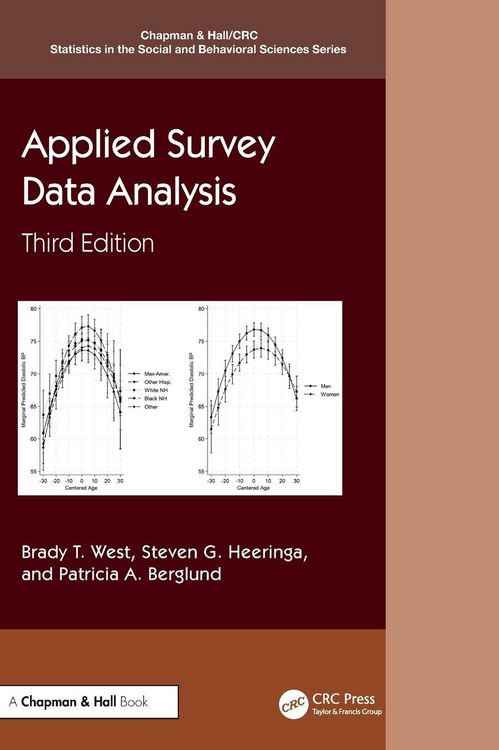Applied Survey Data Analysis
-
- Hardcover ausgewählt
- Taschenbuch
- eBook
-
Sprache:Englisch
-
Auflage:3. Auflage
91,99 €
UVP
115,20 €
inkl. MwSt,
Lieferung nach Hause
Beschreibung
Details
Einband
Gebundene Ausgabe
Erscheinungsdatum
15.04.2025
Abbildungen
schwarz-weiss Illustrationen, Zeichnungen, schwarz-weiss, Tabellen, schwarz-weiss
Verlag
Taylor & FrancisSeitenzahl
558
Maße (L/B/H)
26/18,3/3,4 cm
Gewicht
1220 g
Auflage
3. Auflage
Sprache
Englisch
ISBN
978-1-03-274728-6
Highly recommended by the Journal of Official Statistics, The American Statistician, and other top statistical journals, Applied Survey Data Analysis, Third Edition provides an up-to-date overview of state-of-the-art approaches to the analysis of complex sample survey data. Building on the wealth of material on practical approaches to descriptive analysis and regression modeling from the first and second editions, this third edition further expands the topics covered and presents more step-by-step examples of modern approaches to the analysis of survey data using the newest statistical software procedures.
New to the Third Edition:
- Applied Bayesian methods for the analysis of complex sample survey data using available software implementing these methods
- State-of-the-art methods and software for the analysis of survey data collected from non-probability samples
- Software for modern applications of machine learning techniques to complex sample survey data
- A completely revamped website providing code for replicating all the analyses illustrated in the book using Stata, SAS, SPSS, R, Mplus, SUDAAN, WesVar, and IVEware
- New end-of-chapter exercises, allowing for practice implementing the methods, including Bayesian analysis exercises
- Updated summaries of the newest literature on the analysis of survey data collected from complex samples
- An updated review of software packages currently available for the analysis of complex sample survey data
Designed for readers working in a wide array of disciplines who conduct secondary analyses of survey data as part of their applied work, this book continues to provide a practical and accessible guide to the analysis of survey data. Continuing to use an example-driven approach to clearly illustrate analysis methods and software, the third edition contains many new examples and practical exercises based on recent versions of real-world survey data sets. Although the authors continue to use Stata for most examples in the text, they also offer the newest code for replicating the examples in other popular software packages on the book's revamped website.
Unsere Kundinnen und Kunden meinen
Verfassen Sie die erste Bewertung zu diesem Artikel
Helfen Sie anderen Kund*innen durch Ihre Meinung
Kurze Frage zu unserer Seite
Vielen Dank für dein Feedback
Wir nutzen dein Feedback, um unsere Produktseiten zu verbessern. Bitte habe Verständnis, dass wir dir keine Rückmeldung geben können. Falls du Kontakt mit uns aufnehmen möchtest, kannst du dich aber gerne an unseren Kund*innenservice wenden.
zum Kundenservice
